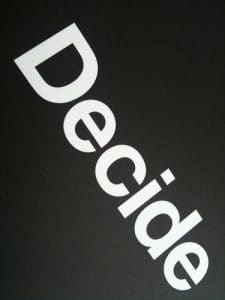3 Ways to Make Better Decisions

Some of my clients will say to me:
“Why do I always end up drinking more than I wanted? I just don’t know.”
“I wish I could change how I talk to my partner. We always seem to end up fighting. I just don’t know what to do.”
“I can’t believe it. Once again, I’m in a dead-end job. How does this happen? I really don’t know.”
The question is, do they really not know?
We often come up with the words, “I don’t know” to avoid solving a problem. “I don’t know” says one of two things, either A) we don’t know some sort of information and we hope that we will be left alone or B) that we don’t want to think about it, so perhaps someone else will tell us the answer.
Now, of course, there are some kinds of information we really do not know. Like what the capital of Canada is? Someone can look me in the eye and say “I don’t know” and I can accept that. (It’s Ottawa.) But when we ask how someone felt about being yelled at and they look at their shoes and say “I don’t know,” we probably do not believe it.
Often, our knowledge of our lives gets buried in a mass of (often unpleasant) information. For many, taking time to reflect, leaves them flooded with a host of painful memories, thoughts, and emotions. For example, we go to college and we may plan for graduation, getting the job of our dreams, marrying the person our heart has pictured, buying a car, a house; living the dream.
However, as the days go by, our education seems less important and that person across the table looks better and better, so we go out and get married. We have kids and can no longer afford to continue in college. So we get a job, but we can’t afford a car. We can barely afford an apartment, and the dream begins disappearing a little every day. We end up feeling trapped and so does our partner. We blame them; they blames us.
Sometimes we may look around at our lives and wonder what we ever did that landed us in this mess. So much of what we achieve results from a lifetime of decisions, large and small. We choose our clothes, job, relationships and everything in between. Our choices may lead us to the peak of our potential, or leave us meandering in the valleys of doubt and guilt. Yet despite their power, most decisions happen so automatically we barely even realize we are making them.
So, if our lives are not exactly where we want them to be, maybe we should change the way we make choices.
We can hang onto our unattainable dreams and feel like a failure. Overtime we may feel guilt for failing. From this guilt comes a wave of anger towards the person we promised to love, honor, and cherish, which will eventually become bitterness and resentment. All because two people are choosing to assign blame, rather than accept the reality of their own choices and adjust their expectations to include the changes in their lives.
Below are some ways we can start making better decisions:
• You can remind yourself that imperfect judgment is called a mistake and it is not the end of the world. You have made many good decisions and have made mistakes. You are more than the sum of your successes and mistakes. Your performance will vary from day to day, hour to hour, and you can separate your performance from who you are as a human. You are not worthless even if you make mistake. Doing poorly never makes you a bad person — only imperfect. You have a right to be wrong. You can separate the rating of your behavior from the rating of yourself. You have put up with disappointments all your life; you can tolerate this one too. Not getting your way is disappointing and inconvenient, which you deal with on a daily basis. In order to achieve pleasant results, you often have to do unpleasant things. Yes, it is a pain to do this now, but it will be much harder if you do it later.
• Give yourself credit for making successful judgments in the past. You can build on your past successes. Your mind may be quick to criticize your mistakes, but very slow to validate your success. If you cannot acknowledge your own achievements, you look to others for approval. This means you give control over what is a success, control over your self worth, over your confidence, to other people. When you look to others for approval, they control your confidence. You cannot build on your success and develop confidence. Instead, you can choose to say, “I did that. I got it done and I made it happen.” That is not conceit, it is not “smug self-satisfaction.” It is confidence. It is validating your efforts to face a difficulty and get through it the best you can.
• You can replace your self-critical thoughts with more realistic ones, such as: “My judgment is good enough that I got through this. I did the best I could with the information I had at the time. My mistakes only prove that I am human. I am lovable and worthwhile regardless of the outcome. It would be nice if others recognized my efforts. But that is only a preference.”
Tags: Anger Management, Archive
